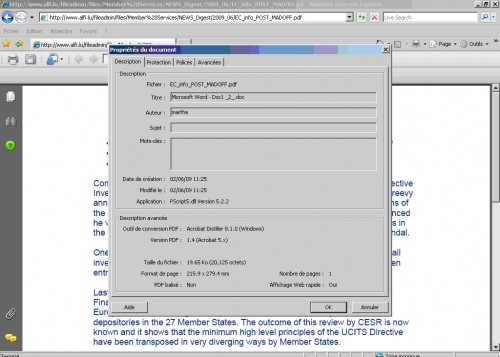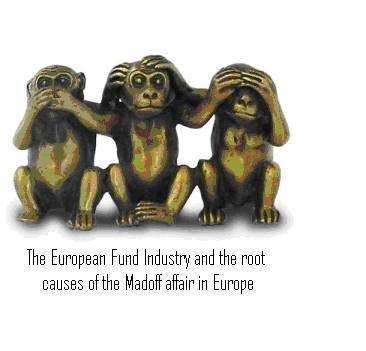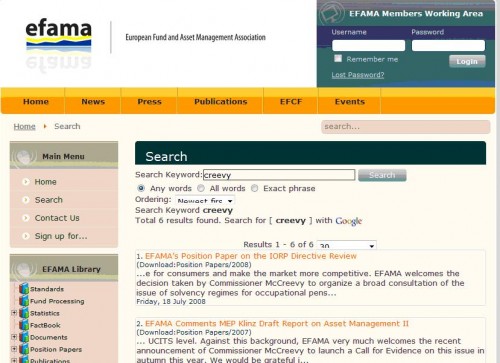07/03/2009
The base of funds is confidence, and the base of confidence is the truth
A couple of days ago I wrote an article to comment the last EFAMA report that is quite surprising in the way it handles the Madoff story in Europe.
I concluded that investors cannot rely on the EFAMA to tighten up the ship on the root causes of the Madoff fraud in Europe.
As I said in a press release issued from http://europa.eu late May, it was stated the following information:
Commissioner McCreevy initiates clarification of UCITS (Undertakings for Collective Investment in Transferable Securities) regulations regime. Commissioner McCreevy announced today in Brussels that he intends to clarify and strengthen provisions of the UCITs regime particularly as regards the liability of depositories. He announced he will launch a consultation before the end of June to deal with inconsistencies in the application of the UCITS directive which were shown by the Madoff scandal. One of the consequences of the Madoff scandal in the EU is that it affected retail investors who had invested in certain UCITS funds the assets of which had been entrusted to a Madoff entity as a sub-custodian. Last December (MEMO/09/27) Commissioner McCreevy informed Ministers of Finance that he had asked his services to work closely with the Committee of European Securities Regulators (CESR) to look into the liability of the UCITS depositories in the 27 Member States. The outcome of this review by CESR is now known and it shows that the minimum high level principles of the UCITS Directive have been transposed in very diverging ways by Member States. The outcome is an unlevel playing field. This means that some EU investors in UCITS funds are better protected than others. On the other hand, the Commission has made stringent proposals on the regulation of depositories, their liability, eligibility, etc in its recent proposal for Alternative Investment Fund Managers (AIFM) (MEMO/09/211). According to this proposal, depositories should be credit institutions based, authorised and supervised in the EU. Their liability has been strengthened, including an inversion of the burden of proof, and there are clear provisions on delegation as well as on the conditions under which assets can be entrusted to depositories outside the EU. Mr McCreevy wants to extend such provisions to UCITS funds. The new proposal should at least cover what the AIFM proposal covers. It would not be appropriate to have a less stringent approach for retail investors than for professional investors.
It is extraordinary that the funds business community boycotted more or less the information.
I looked at the EFAMA website, the ALFI website and the ABBL website.
There is nothing about McCreevy’s opinion on the EFAMA website:
Additionally I found an opinion from the EFAMA to the CESR that is worth reading:
It is stated that “From the industry’s perspective, the analysis of the implementation of the role and liabilities of depositaries in different Member State following the Madoff fraud, and the introduction of any new measures resulting thereof, are outside the scope of the present mandate. To be able to maintain its own timetable, CESR should clearly limit itself to giving advice on Articles 23 and 33 of the UCITS IV Directive”. (source: EFAMA Response to CESR Call for Evidence/UCITS Level 2, 31/03/2009, page 3)
There is a psychological denial of the issue of the depositary with no will to tighten up the ship on the role and liabilities of depositaries in different Member State following the Madoff fraud i.e. no will to establish the truth, which is that the lax implementation of the directive, the so called clear and pragmatic rules, created the risk in Luxembourg.
Nobody in the industry’s perspective is actually in favour of this truth.
The jurisdiction from which the drift took place has the same behaviour that it exported while using a corporate spirit at the European level.
McCreevy’s opinion is quoted in the alfi news digest dated June 2009 in a minimizing way by not stating with accuracy the key findings:
It is stated page 5 out of 8 that “Commissioner McCreevy initiates clarification of UCITS (Undertakings for Collective Investment in Transferable Securities) regulations regime. The commissioner McCreevy announced that he intends to clarify and strengthen provisions of the UCITS regime particularly as regards the liability of depositories. He will launch a consultation before the end of June to deal with inconsistencies in the application of the UCITS directive. Please click here for more information.”
It is actually the beginning of the press release. The ALFI was unable to state notably that “the minimum high level principles of the UCITS Directive have been transposed in very diverging ways by Member States. The outcome is an unlevel playing field. This means that some EU investors in UCITS funds are better protected than others”. However there is a link to the full opinion.
The linked document was created on 2 June 2009

Why didn’t they quote this critical abstract?
An honest short communication should have been something like: Commissioner McCreevy initiates clarification of UCITS (Undertakings for Collective Investment in Transferable Securities) regulations regime as the minimum high level principles of the UCITS Directive have been transposed in very diverging (http://www.merriam-webster.com/dictionary/diverging) ways by Member States. The outcome is an unlevel playing field. This means that some EU investors in UCITS funds are better protected than others
The ABBL had published the information in a satisfying way a couple of days before and Luxembourg’s professionals of investment funds – by the way the first concerned - were definitely reluctant to publish about McCreevy’s opinion with accuracy.
Anyway there was no debate in Luxembourg about the issue and the debate is locked at the EFAMA level.
The above are facts that corroborate that the leaders of the European investment funds industry cannot be trusted by investors as the base of the investment funds industry is confidence, and the base of confidence is the truth.
What should have been done?
Luxembourg should have made amend and admitted at the beginning that the transposition opened the drift. A directive is a binding act of general application addressed to the Member States. Like a Community regulation or a decision, it is binding upon those to whom it is addressed. It is binding in its entirety and so may not be applied incompletely, selectively or partially. But a directive leaves to the national authorities the choice of form and methods. Because of its pragmatic lawyers and professionals, Luxembourg did not transpose with accuracy articles 7 and 10 of the directive, which is easily verifiable.
The Luxembourg fund industry should have demonstrated its great sense of responsibility:
- by compensating every investor (if the official amount of the fraud – less than EUR 2 billions - is actual, it was worth compensating because of the reputational stake),
- by correcting the legal and regulatory framework that opened the drift
Luxembourg and UBS should have negotiated for UBS to compensate partially the Luxembourg financial center as there is probably a sharing of wrongs.
17:30 Posted in General | Permalink | Comments (0)
07/01/2009
Bad times for European tax evaders and jurisdictions that welcome tax evasion
In a Judgment of the Court of Justice dated 11 June 2009 (Joined Cases C-155/08 and C-157/08 : X and E.H.A. Passenheim-van Schoot v Staatssecretaris van Financiën) it is stated that an extended recovery period where taxable assets which have been concealed from the tax authorities are held in another Member State is in accordance with community law.
In so far as the tax authorities have no evidence of the existence of such assets, an extended recovery period does not go beyond what is necessary to guarantee the effectiveness of fiscal supervision and to prevent tax evasion.
The Court distinguishes two situations:
The first situation is where items which are taxable in one Member State and located in another Member State have been concealed from the tax authorities of the first Member State and the latter do not have any evidence of the existence of those items which would enable an investigation to be initiated. In that situation, the first Member State is unable to request the competent authorities of the other Member State to communicate to it the information necessary to establish correctly the amount of tax due.
In those circumstances, making taxable items which have been concealed from the tax authorities subject to an extended recovery period of 12 years does not go beyond what is necessary to guarantee the effectiveness of fiscal supervision and to prevent tax evasion.
Nor does Community law preclude, in this situation, the fine imposed for concealment of the foreign assets and income from being calculated as a proportion of the amount to be recovered and over that longer period.
The second situation is where the tax authorities of a Member State have evidence concerning taxable items located in another Member State which enables an investigation to be initiated. In that situation, the application by the first Member State of an extended recovery period which is not specifically intended to permit the tax authorities of that Member State to have effective recourse to mechanisms of mutual assistance between Member States and which commences once the taxable items concerned are located in another Member State cannot be justified.
08:50 Posted in General | Permalink | Comments (0)
06/30/2009
Letter to Commissioner McCreevy
I wrote yesterday an article to explain why it is not very probable that the light is made on the responsibility for the depositary within the framework of the EFAMA.
I took again these arguments to send the following mail to Commissioner McCreevy:
Dear Mr McCreevy
Further to Niall Bohan’s answer on your behalf last 20 March 2009 (Cf. my query dated 13 February on "The UCITS Directive and its transposition in Luxembourg and Ireland in the context of the Madoff case"), I would like to share with you my views on the way the EFAMA is handling the issue, which is worrying for the credibility of the UCITS.
The reading of the EFAMA annual report 2008-2009 (pdf file created on 16 June 2009 and modified on 17 June 2009) allows to concluding that it does not seem aware of the stake of the truth on the depositary’s liability.
There is a development about the depositary’s liability, which wants commenting (pages 18 and 19):
1. Your conclusion dated 28 May (the minimum high level principles of the UCITS Directive have been transposed in very diverging ways by Member States. The outcome is an unlevel playing field. This means that some EU investors in UCITS funds are better protected than others) (Source: Midday Express EXME09 / 28.05) is ignored. This opinion was however known when the EFAMA report was written and should have been taken into account.
2. The CSSF statement dated 27 May (As the CSSF has previously noted, UBSL shall have to indemnify a UCI depositor according to its obligations as a Luxembourg depositary bank, subject to valid and opposable contractual clauses to the contrary and, as the case may be, to a court decision in such matter) is ignored. This press release that made investors upset was however known when the EFAMA report was written and should have been taken into account.
3. The EFAMA bet that the European commission will do nothing: it states in its report that “signals seem to indicate that the Commission itself is not keen to “tighten up” the rules in the UCITS Directive regarding the responsibility of the depositary for safekeeping and the conditions for delegation of custody and would prefer to resort to other means rather than re-opening the Directive to achieve clarification on these issues.”
4. Above all, the EFAMA admits that it wants to hush up the issue of the transposition of the UCITS directive in Luxembourg in a manner that opened the drift. In other words the EFAMA does not want to tighten up the ship and sanction failures.
The EFAMA states that its “position in this discussion has been very clear from the beginning: contribute to making the discussion more objective and to putting an end to reciprocal incrimination, meet the concerned competent authorities to hear about the progress of their research and to remind them that the issue is urgent as the UCITS brand and investors’ trust are at risk, underline that investor protection remains EFAMA’s top priority, draw attention to the fact that the mechanism of the UCITS Directive provides for a high level of investor protection and that it is not yet clear that any investor in a UCITS will lose money, support the Commission in its view that a fundamental analysis is needed before discussing new or additional legislation.”
“Contribute to making the discussion more objective and to putting an end to reciprocal incrimination” is its first goal and is more important than “investor protection”, which is in third position. As far as competent authorities are concerned, the Luxembourg regulator (the CSSF) was disappointing: it did not sanction UBS (there would have been a sanction in any seriously regulated jurisdiction), and should have been any sanction, the amount would have been anyway ridiculous compared to what is done in any seriously regulated jurisdiction. This was admitted by the former head of the CSSF who just retired (See Paperjam, 20 mars 2009: http://www.paperjam.lu/archives/2009/03/2003_schaus/index... )
The appointment of Claude Kremer, chairman of the the ALFI (the official representative body for the Luxembourg investment fund industry) as EFAMA Vice-President makes difficult even impossible the principle of calling into question in the framework of the EFAMA the Luxembourg legal and regulatory framework.
I am afraid that investors and the European Commission cannot rely on the EFAMA, which seems much more business-oriented than client-oriented.
Two relevant questions should actually be answered:
Who (individual and/or legal person) introduced Madoff in Luxembourg (Europe)?
Probably someone that has/had an office in New York and that condoned red flags (See Greg N. Gregoriou and François-Serge Lhabitant, Madoff: A Riot of Red Flags. EDHEC, 16 February 2009).
Who (individual and/or legal person) support (in an opinion, in a committee…) the remove of two critical provisions of the Directive in the Luxembourg law of transposition, which opened the drift?
As I said, there are actually two critical provisions that are clearly missing in the Luxembourg text but that can be found in the Irish text or the French text:
- On the one hand, article 7 of the UCITS directive that states that “1. A unit trust's assets must be entrusted to a depositary for safekeeping”. The word “safekeeping” (that is missing is the French version of the article) was removed in the transposition (Cf. article 17 of the Luxembourg Law of 20 December 2002). Additionally, Circular IMS 91/75 (as amended by Circular CSSF 05/177) dated 21 January 1991 states that “The concept of custody used to describe the general mission of the depositary should be understood not in the sense of “safekeeping”, but in the sense of “supervision” (…) The depositary has discharged its duty of supervision when it is satisfied from the outset and during the whole of the duration of the contract that the third parties with which the assets of the UCI are on deposit are reputable and competent and have sufficient financial resources.“ Madoff was reputable and competent and had sufficient financial resources.
- On the other hand, Article 10 of the UCIT directive that states that “ 1. No single company shall act as both management company and depositary”. This provision is not in the Luxembourg text. This first paragraph was removed to only transpose literally paragraph 2 that states that “2. In the context of their respective roles the management company and the depositary must act independently and solely in the interest of the unit-holders.” (Cf. article 20 of the Luxembourg law of 20 December 2002). What is not clearly prohibited by the law is possible and it seems that UBS acted both as Management Company and depositary.
The European Commission has just referred Luxembourg to the European Court of Justice over its incorrect application of the Savings Directive. In my opinion, the European Commission should refer as well Luxembourg to the European Court of Justice over its incorrect application of certain provisions of the UCITS directive. There must be no tolerance for those so-called pragmatic professionals that caused prejudice to investors, and put the European fund industry at risk by harming its credibility.
Best regards.
Jérôme Turquey
Consultant in Business Ethics and Reputational Risk
http://ethiquedesplaces.blogspirit.com
08:40 Posted in General | Permalink | Comments (0)








